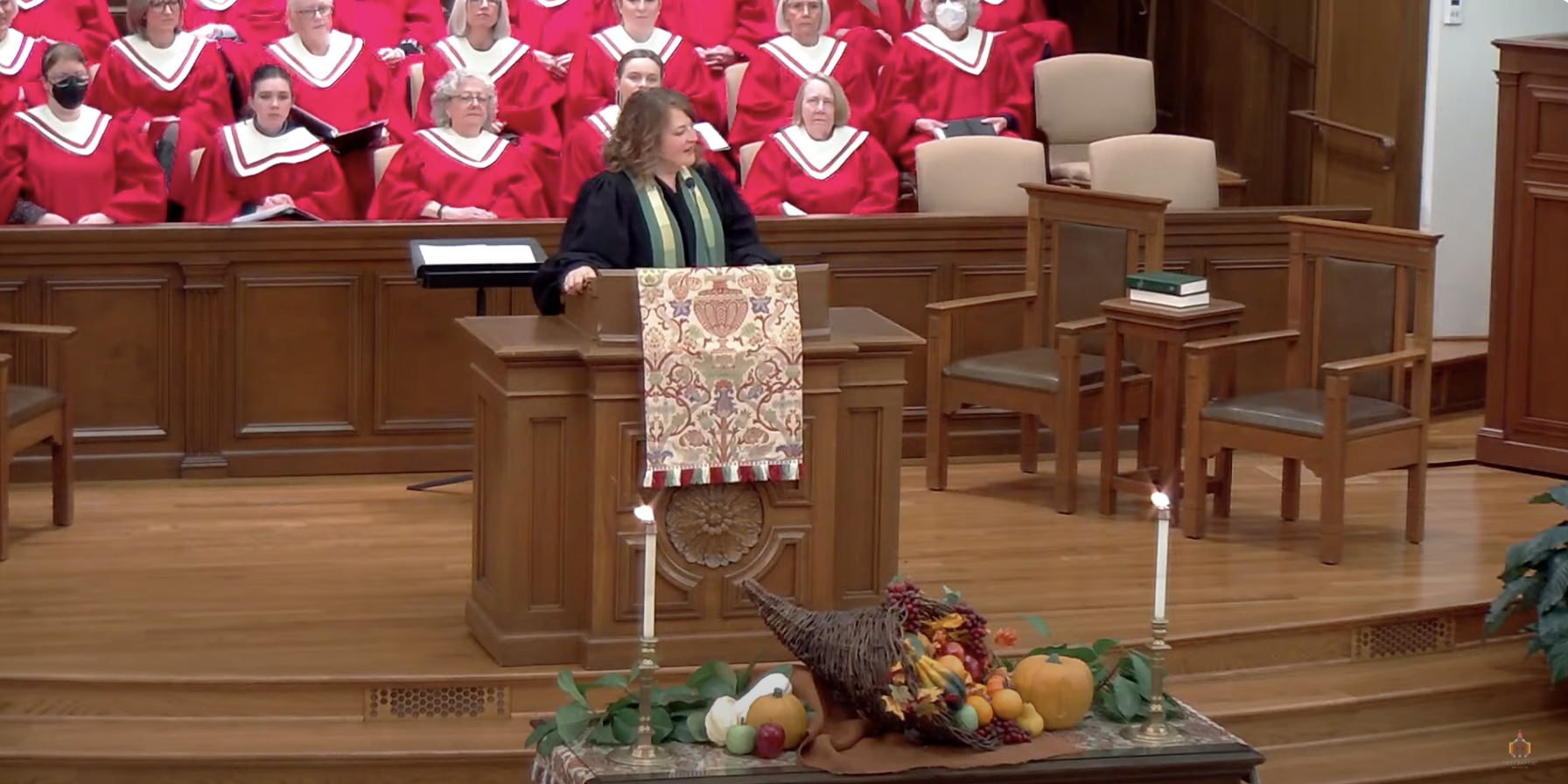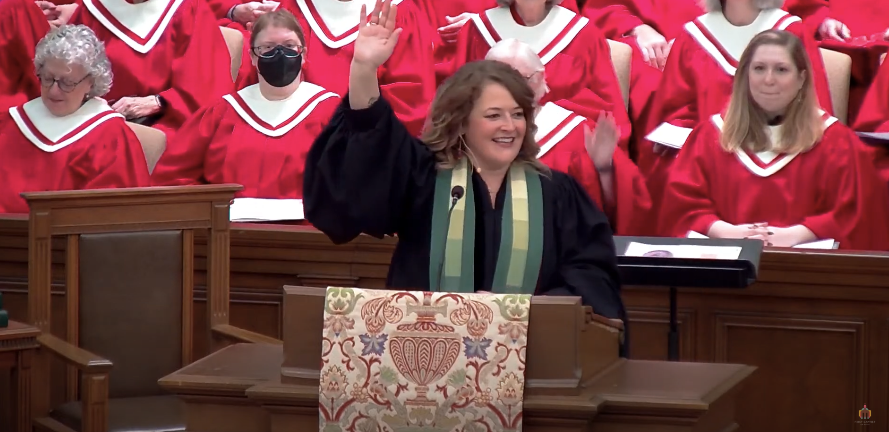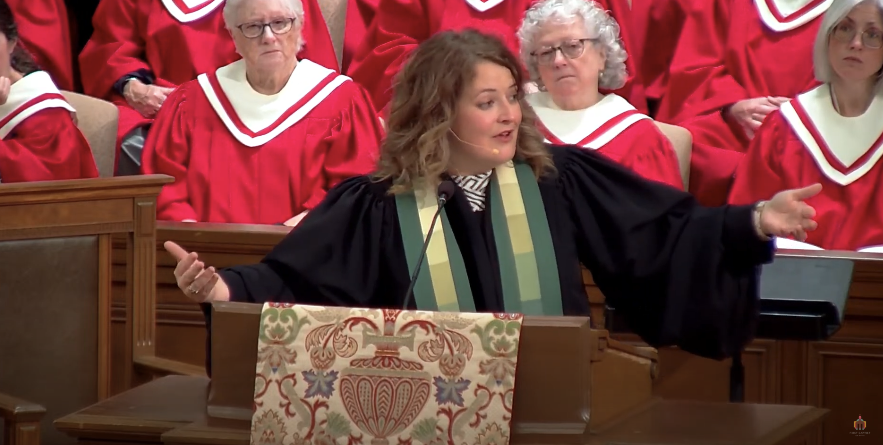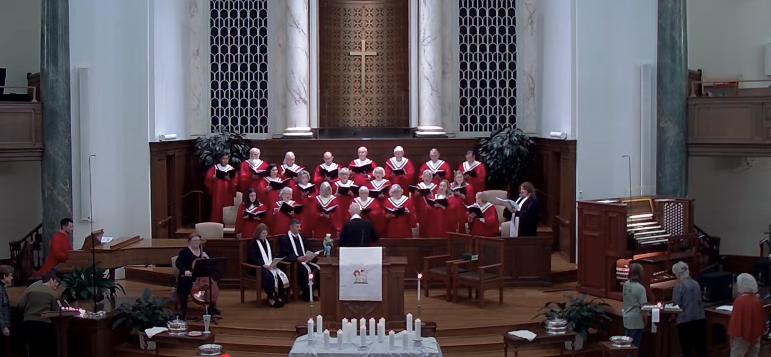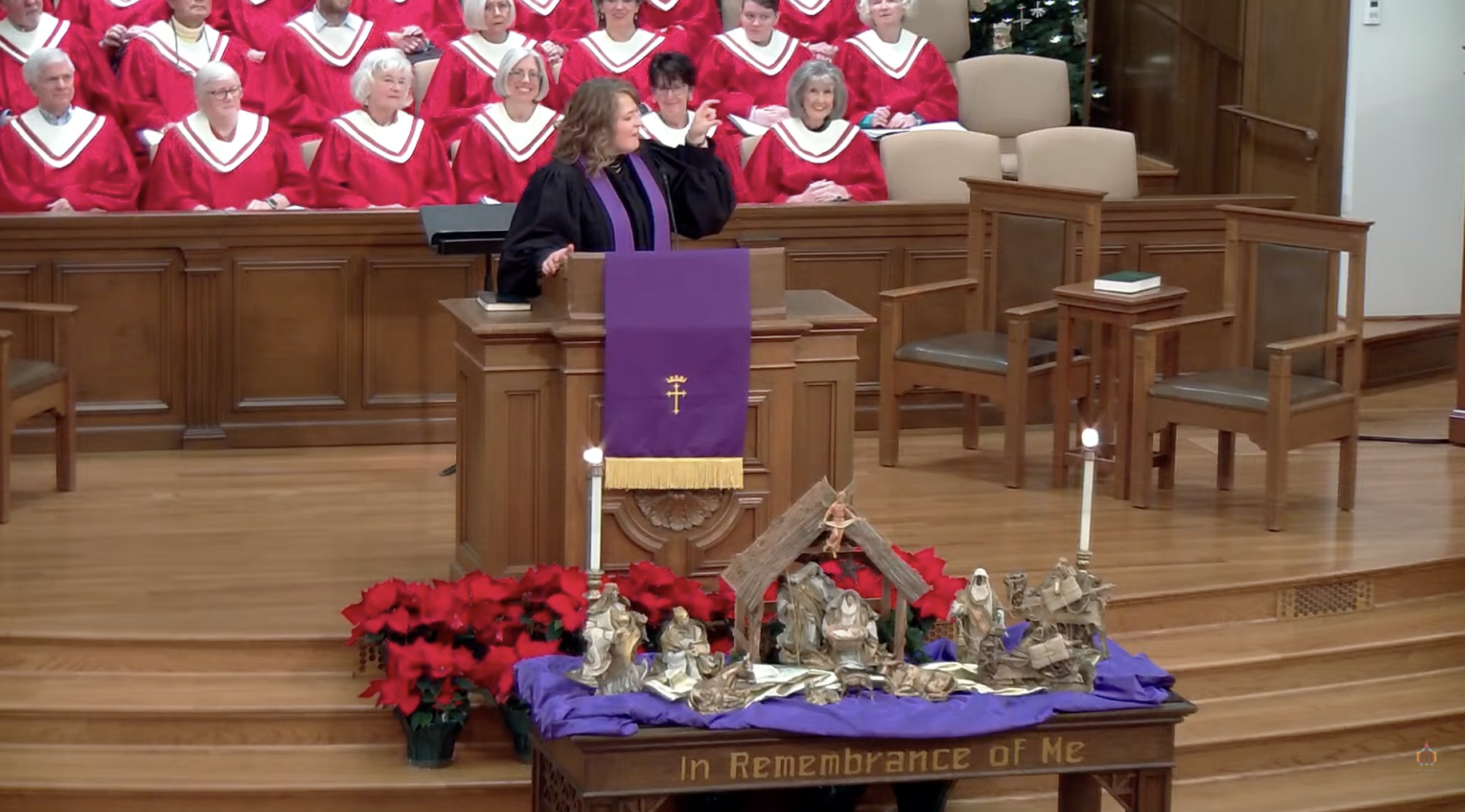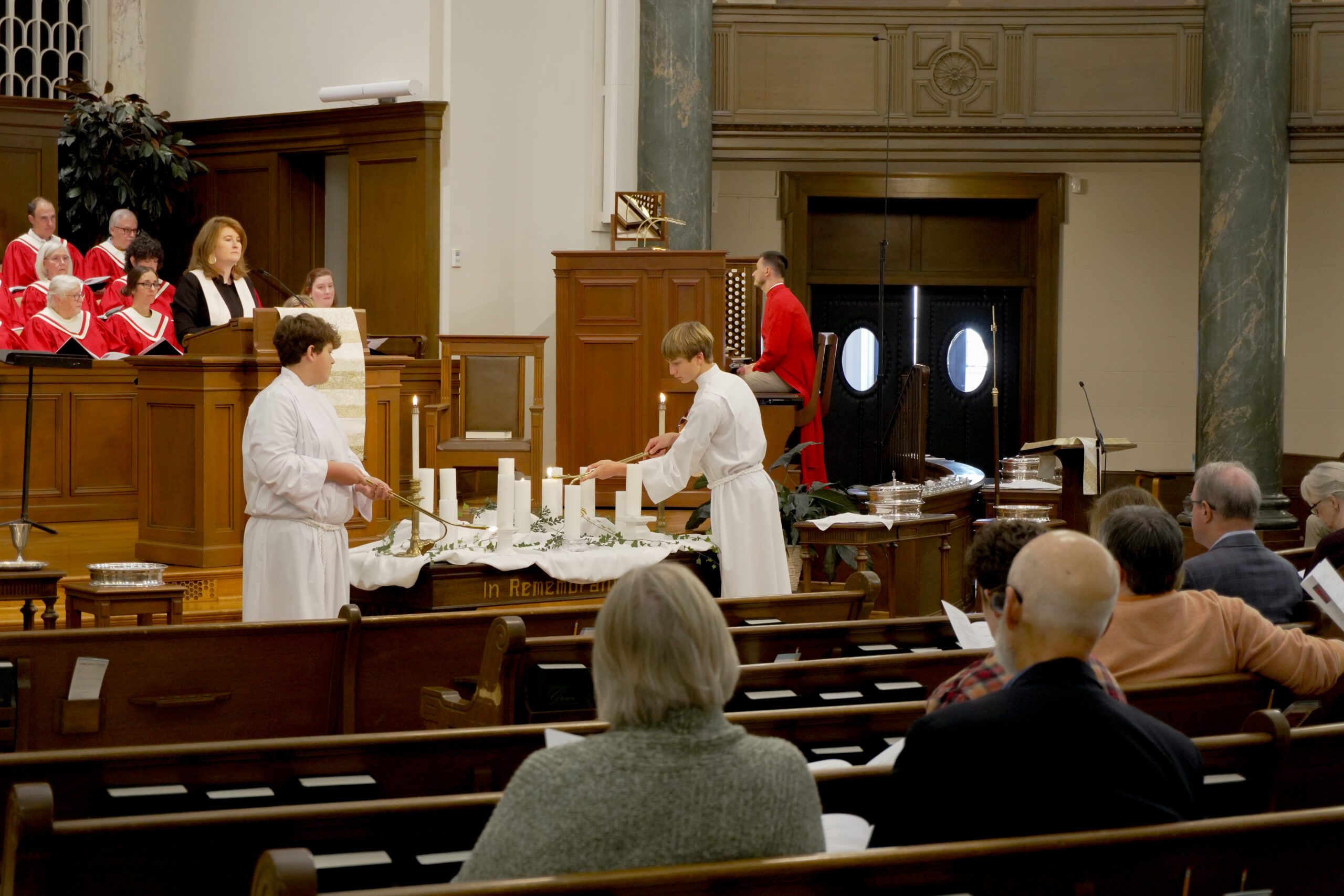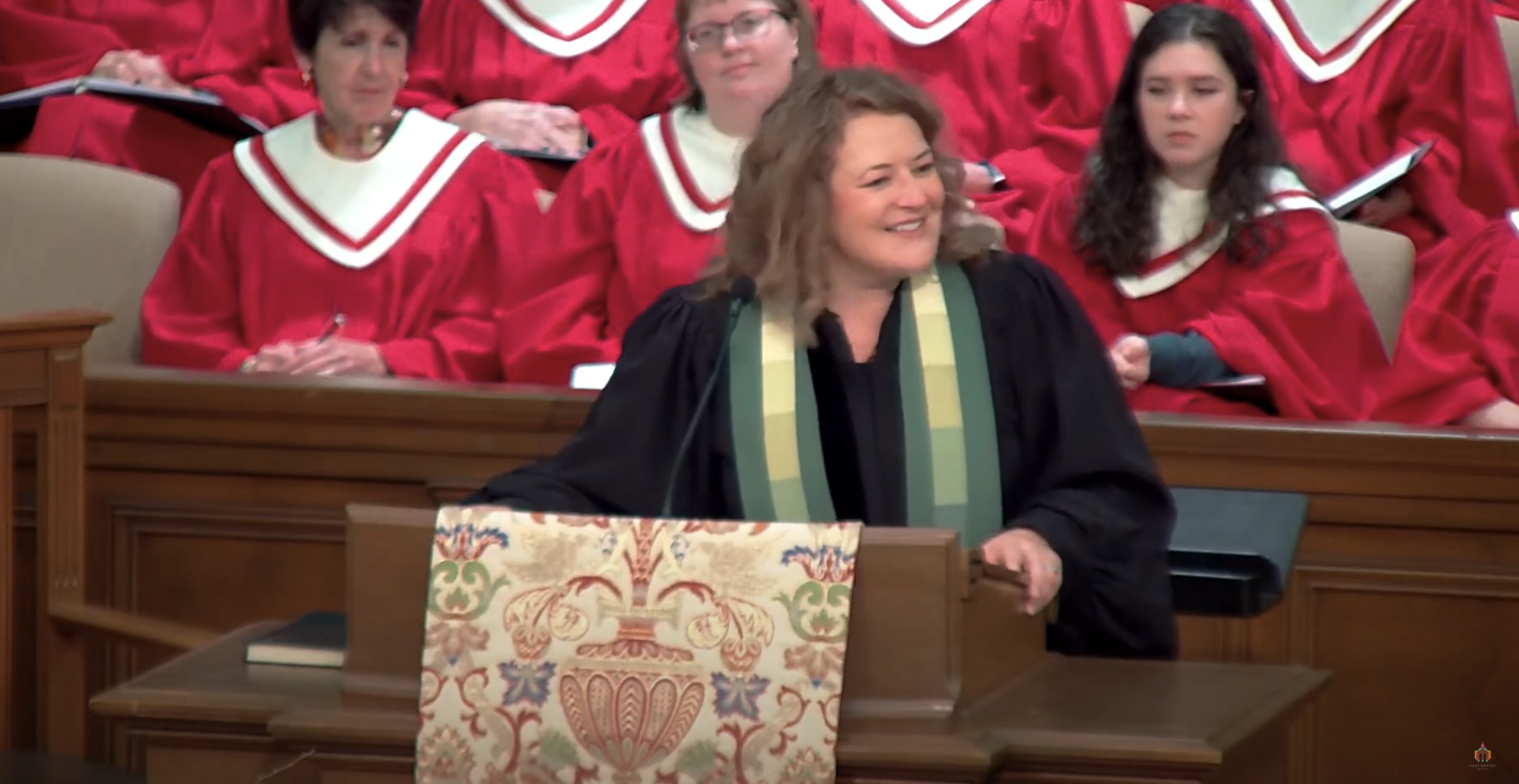I.Every year on All Saints Sunday, I’m struck again by the profound gift and challenge of life together. I see in your faces the grief you’ve experienced as you’ve lost loved ones. I see etched in the lines and furrows of your brow what it meant to you to love with depth and purpose, what it cost you, what it gave you. I see evidence of both the beauty and the challenge of living your lives and loving other people.
It isn’t new, of course, or unique. For if only you look back across the sweep of history, you’ll see it. Today we’ll look back to a particular moment in the Gospel of Mark, where all the experiences of Jesus leading up to our passage today echo that truth: life together is hard. Questions and accusations and suspicions of his authority were flying at Jesus from all angles. His life and teachings were causing a stir, and the religious leaders were among the hornets whose nest he seemed to have disturbed.
That’s the climate around him when a scribe comes near to Jesus. Not a lawyer who wants to cross-examine or a Pharisee who wants to question orthodoxy, but rather a scribe. Someone whose job it is to write it down, to capture it accurately, to get it right. Perhaps that was on his mind as he waded past the squabbling religious leaders to get right to the point with Jesus. “Which commandment is first of all?,” he asked. What matters most? Did you catch that Jesus’s first command in response is to hear, to listen? He calls back to the ancient words captured in Deuteronomy, echoing this daily prayer of the Israelites to God, called the Shema. “Hear o Israel,” the prayer begins, “the Lord our God, the Lord is one.”
Though this anecdote of the greatest commandment appears in three of the four gospels, in Mark is the only place it’s introduced by the Shema. Frederick Buechner reminds us that God’s people first heard the Shema in the wilderness, the very place where they wandered in disorder: lost, afraid, hungry, dispirited, not knowing what was to become of them, with no resources left, afraid they were going to die with nothing left except whatever they had in their hearts. It was perhaps as much a promise as it was a commandment. “Love and you will live.”1
Jesus says, “You shall love the Lord your God with all your heart, and with all your soul, and with all your mind, and with all your strength,” Jesus says. Loving God matters most. It’s first and foremost, but not all. “The second is this,” he continues, “you shall love your neighbor as yourself. There is no other commandment greater than these.” Meaning: these are at the heart of it all. They matter most. This is the center of the story of what has been and the story of what will be. Write this down. Hear it correctly. And when all else fails, love.
Thanks be to God for this scribe who got it right. For is there a more perfect summary of living in the Way of Jesus than to love God and love neighbor? Yet though the commandment of Jesus may be perfect, as essential as it is, the commandment lived out by humans is anything but perfect. Because love is messy! Love can be rough around the edges, unsure and hard. Love can be grief and loss. Love can be risk and cost. Love is a doing, not just a thinking. As theologian James K. A. Smith says, “to follow Jesus is to become a student of the rabbi who teaches us how to love; to be a disciple of Jesus is to enroll in the school of charity. Jesus is not Lecturer-in-Chief; his school of [love] is not like a lecture hall where we passively take notes while Jesus spouts facts about himself in a litany of text-heavy PowerPoint slides.”2 (To which all God’s children said amen!) Jesus in his very life modeled the full-bodied, whole-hearted kind of love of God and neighbor. It’s the kind of love that stoops and heals, that dines with sinners and chats with saints, that takes and blesses and breaks and gives, the kind that says “let this cup pass from me,” and “not my will but thine be done,” that willingly binds itself to the cross and leaves behind an empty tomb for the sake of the world. That’s what love looks like: real, human, embodied and enfleshed, the kind of love that matters most of all.
II.This image of love that does in all its imperfect beauty reminds me of the story of the 12 year-old daughter whose dad offered to pay her what was a pretty good sum of money if she’d mow the grass. She had never done this before, and was so excited to begin. She approached the task with exacting interest and inspiration, and soon every square inch of the yard was trimmed, edged, blown, and beautiful.
Every square inch except for a few in that little patch over there in the corner that remained uncut. Her dad came out to inspect the yard, and told her that sadly he couldn’t offer her the whole amount they had agreed upon because the whole lawn wasn’t mowed. And to his surprise, the young woman said she’d have to pass up the money because there’s no way she’d mow that corner.
Her dad was so curious, he went over to see why in the world she’d do such a thing. There, right in the center of the patch, sat a large toad. In a moment, Dad knew his daughter’s kind and tender heart would pass up a handful of cash if it meant sparing a life – even the life of a toad.3
“Where there is love, there is disorder,” Anthony de Mello once said of this story. “Perfect order would make the world a graveyard.”4 But when Jesus teaches us how to love, the world becomes site and source for resurrection.
III.So what does it mean to love? Hollywood and Hallmark don’t have a corner on the love definition market! Let’s remember that love is not just affection – but action. Love does. Jesus said here that the kind of love that is essential is loving God with all that we have and all that we are – our heart, soul, mind, and strength – and loving our neighbors as ourselves. Meaning, love is the ethic, the prism through which we are to see the world and act within it. M. Scott Peck says something I share often with couples as they’re preparing to marry, “love is the will to extend one’s self for the purpose of nurturing one’s own or another’s spiritual growth. Love is as love does. Love is an act of will. We don’t have to love, we choose to love.”5
I’ve got to assume that Jesus meant for these two commandments to work together. To follow the way of Jesus, you can’t love God and just put up with your neighbor, right? Nor can you love every neighbor you have and just tolerate God! It’s clear to me that Jesus meant for these two commitments to work together. These aren’t separate commitments, but rather are mutually interdependent, the “moral bedrocks” upon which a faithful life is lived.6 To love God is to love neighbor. To love neighbor is to love God.
IV.If only it were that easy.
On Tuesday night of this week, over 300 of us gathered at Knollwood Baptist Church to learn from our friend and scholar, Bill Leonard, along with Amanda Tyler, executive director of the Baptist Joint Committee and lead organizer of the Christians Against Christian Nationalism campaign. Christian nationalism was our topic for discussion, and in Amanda’s compassionate yet clear way, she outlined just how insidious this lie is that has taken hold among Christians. It’s that lie that God loves the United States more than the world, forgetting “for God so loved the world.” It’s the lie that says that because God loves the United States first and best, then Christianity should hold the highest privileges in our national government. The lie blurs our Christian identity and American citizenship and thus distorting and diluting both. Along the way, it deeply confuses our priorities as Christians. Christian nationalism has people convinced that we should reach for power instead of love, to reach for privilege instead of love, to reach for authority and a tight grasp instead of love. “Because at the heart of Christianity,” Amanda said, “is love!” She repeated the greatest commandment of Jesus, of loving God and neighbor, and called us back in spite of that lie to be bearers of the truth of this greatest commandment, even – especially – in a week like this where our national fervor is at its height.
This example of Christian nationalism is but one in a long line of Christian expressions that mistake our priorities and fail to reach for this highest ideal. Because inevitably, Christians are humans, and humans mess up, and sometimes miss the essential point of love. Whether we’re loving God or neighbor, we get mangled in our feelings and our righteous anger especially this time of year.
Loving is hard, friends, and we can’t do this on our own. Sometimes we need a little help. Sometimes when your actual neighbor has a yard full of political signs that make you shudder, or when your colleague is getting all the way under your skin, when your spouse is … I don’ t know, breathing loud or something, you might need a little help… at least some encouragement to love with any consistency, or generosity, or honesty. That’s where the church comes in. That’s what we do here, right? At her best, the church becomes this school for love, training us up day after day in the way of Jesus.
Note that the scribe who asked the good question understands. “This is much more important than all whole burnt offerings and sacrifices,” yes! More important than our worship, our hymns, our rituals, our communion, our baptisms, our processionals, our candles, our services, as important as these are. Loving God and loving neighbor are more important than our programs, our Bible studies, our small groups, even our capital campaign pledges – though God surely likes those too, I think! At the root, the core, the fundamental expression of who we are to be and what we are to do as the church, is to be people encouraging one another in the Way of Love. Loving God and loving neighbor. It’s what’s most essential to a life of following Jesus.
French bishop and Catholic saint Francis de Sales once spoke of this when he was asked what one must do to attain perfection. “You must love God with all your heart,” he answered, “and your neighbor as yourself.” “But how?,” came the curious response. “I want to know how one is to love God with all one’s heart and one’s neighbor as oneself.”
After many moments of silence, the Bishop finally said, “There are many besides you who want me to tell them of methods and systems and secret ways of becoming perfect, and I can only tell you that the sole secret is a hearty love of God, and the only way of attaining that love is by loving. You learn to speak by speaking, to study by studying, to run by running, to work by working; and just so you learn to love God and people by loving. All those who think to learn in any other way deceive themselves. If you want to love God and others, go on loving God and others, more and more. Those who have made most progress will continually press on, never believing themselves to have reached their end; for love should go on increasing until we draw our last breath.”7
So I ask you today – will you learn to love God and neighbor by loving?
When you sit down at your Thanksgiving table here in a few weeks and hear things you don’t like, will you love God and neighbor?
When you go and cast your vote this week, will you love God and neighbor?
When you wake up, and move about your home, and do your job, and parent your children, and care for your parents, and volunteer with your church, and go to the grocery, and post on the internet, and spend your money, and wind down at night, will you love God and neighbor?
When you remember the saints and celebrate new life, will you love God and neighbor?
V.Let’s not miss that the gospel text ends in stunned silence. “When Jesus saw that the scribe answered wisely, he said to him, ‘you are not far from the kingdom of God.’ After that, no one dared to ask him any question.” That seems to be perhaps a wise posture when Jesus asks us to love. We don’t ask Jesus to specify how, pray tell, we’re to love the neighbor who doesn’t love us back. We don’t attempt to convince Jesus that some are the real neighbors, and others are just the people we put up with. No – we learn to love by loving. And in our lips and our hearts, sometimes we simply are quiet, absorbing this hardest and greatest and most transformative directive of them all, as much a promise as it was a commandment. Love and you will live. May it be so!


